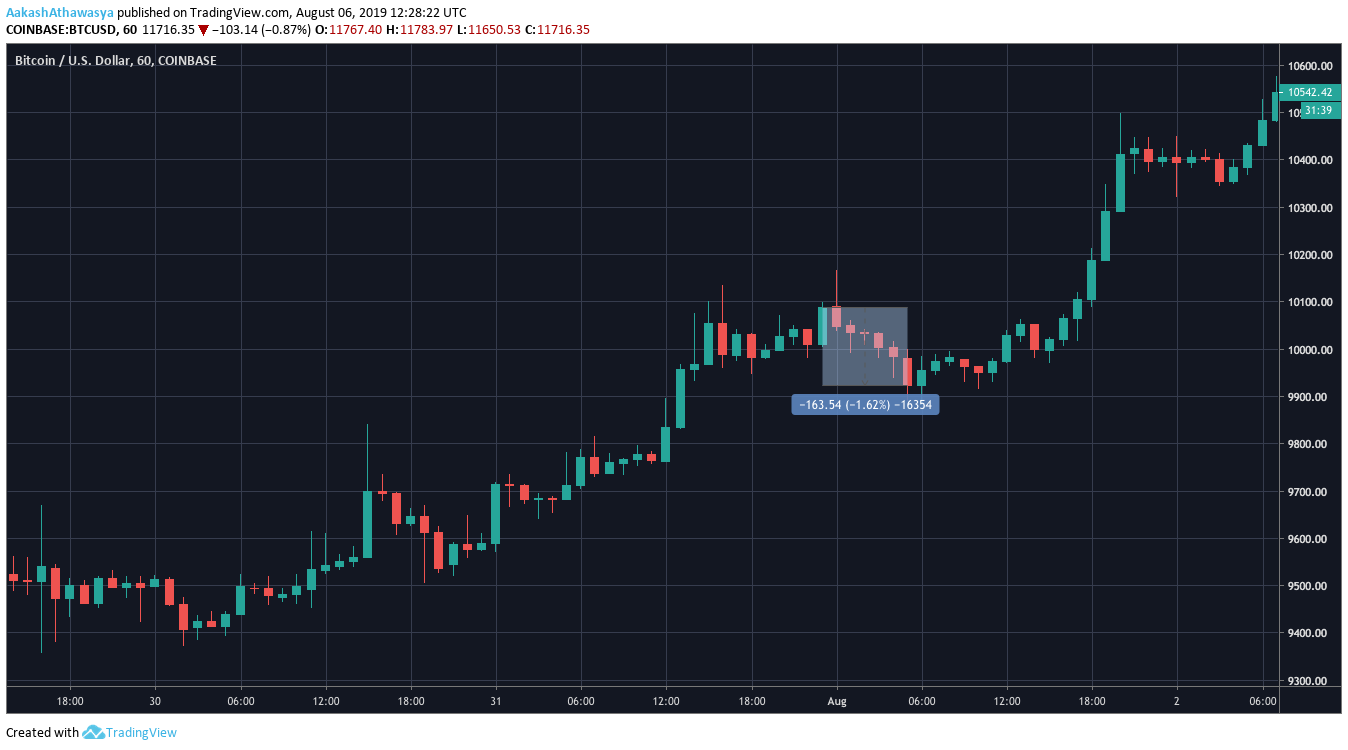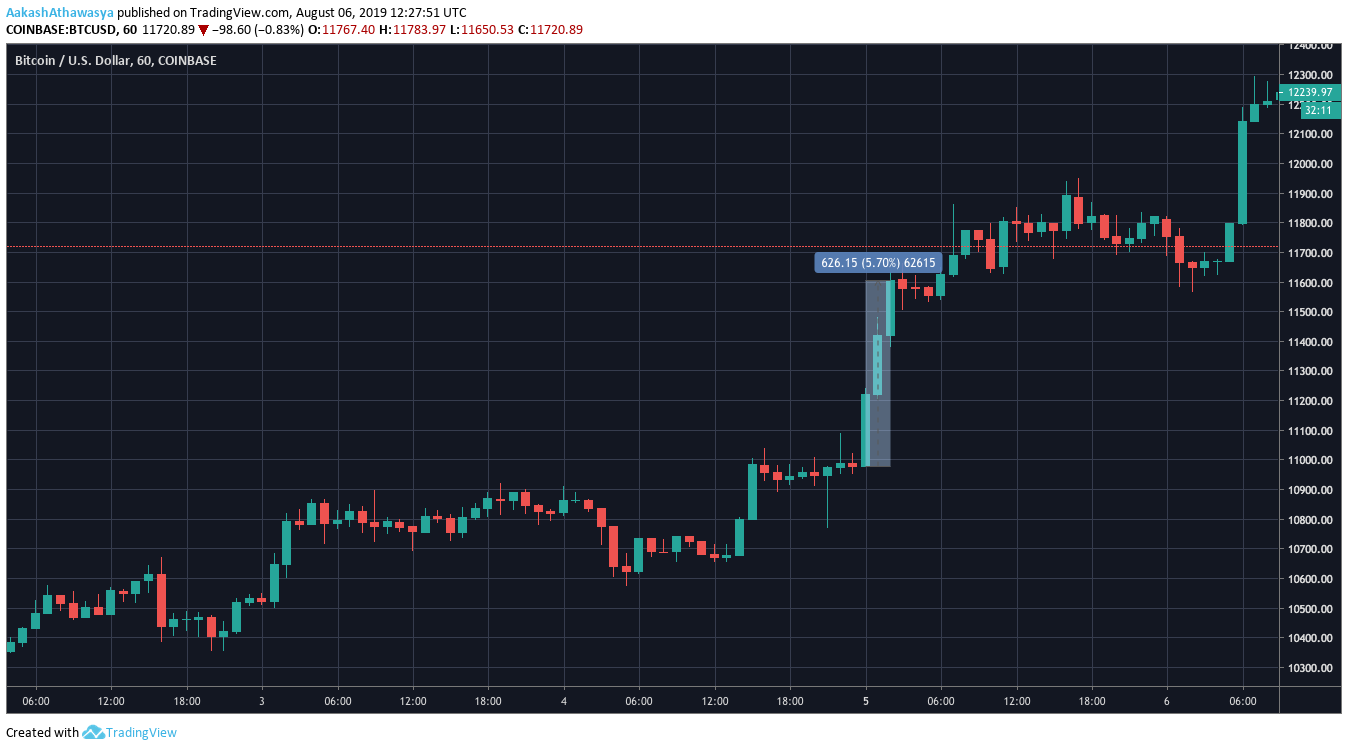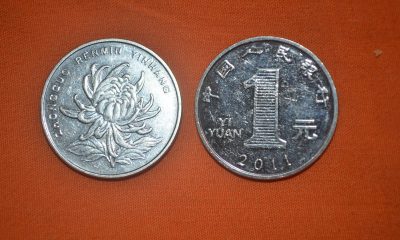Chinese dragon tames the American eagle as Bitcoin adopts an Act East policy

All signs point eastward, as BTC moves sideways.
In the past week, two key decisions have rocked the global markets, while also contributing to ripple effects beyond their domestic markets. The United States and China, at loggerheads for several months over growing trade tensions, took macro-economic decisions not seen for a decade and from the standpoint of the cryptocurrency market, one rocked the market while the other was met with stony silence.
At the beginning of the month, the United States’ Federal Reserve cut interest rates for the first time since the global financial crisis of 2008. Chairman Jerome Powell stated that the objective of taking this bold decision was to work back to the inflation targets set forth and the reinvigorate the economy.
More recently, the People’s Bank of China [PBoC] announced that it would be reducing the Chinese yuan’s [RMB] daily reference rate below 7 per dollar, an unprecedented move not seen in over a decade.
In isolation, the two moves seem to stem from economic reasoning. In the context of the trade war between the two giant economies however, these are considered careful macro-economic attacks. The RMB devaluation is suspected to be Beijing’s retaliation to the Trump administration’s imposition of a 10 percent tariff on $300 billion Chinese imports that will commence, come the start of the next month.
Bitcoin, on the other side of things, seems to be having a topsy-turvy week in the midst of this economic turmoil. Besides valuing its decentralized nature, in context of these very centralized economic decisions that set ripple effect for world economies and world currencies, the top cryptocurrency has seen varying movements with reference to the two key decisions resulting in the policy of cryptocurrency being made clearer.
Born in the USA

Source: Trading View
Despite the initial birth-place of Bitcoin and the cyberpunk culture being the United States of America, the modern day crypto-scene is far from it. With regulations hampering innovation and the East Asian market growing, it’s quite clear that the American hold on the cryptocurrency market, at least from an economic perspective, is lacking when compared to their Chinese counterparts.
From a regulatory perspective, criticism from US lawmakers do have a harsh impact on the price of Bitcoin, as was seen during last month’s attacks on Libra and the spillover effect it had on the larger coin market.
The Federal Reserve rates cut, despite sending the world’s key stock indices into a tumble, did not have a stark effect on the price of Bitcoin. The price of Bitcoin dropped by less than 1.6 percent in the ensuing period of the cut, from just above $10,000 to $9,935.
Several notable analysts have hailed Bitcoin’s resolute nature of holding strong, despite the rates cut and even ‘surviving its first every Fed rate cut,’ as Fundstrat’s Tom Lee noted. He added that despite the price drop, the movement, or lack thereof, was a “good sign.” Economist Alex Krüger likened any correlation of Bitcoin moving vis-à-vis the Fed rates cut to ‘living in an imaginary alternative reality.’
Far East Movement

Source: Trading View
While it can be ascertained that the Federal funds rate did not have a large impact on the price of Bitcoin, the same cannot be said about the PBoC’s decision.
As China devalued the RMB, the price of Bitcoin surged past $11,000 and soon toppled the $12,000 barrier, all within a few hours. At the peak of the bullish press, Bitcoin rose by 5.72 percent in a period of three hours, adding a whopping $700 to its valuation.
With the onset of what has been called “the currency wars,” several safe-haven assets have recorded an increase in price following the yuan devaluation. Both gold and cryptocurrencies saw an increase in their price on August 5, following the PBoC’s decision.
However, if cryptocurrencies are to be looked at more broadly, the severity of this nature of being a ‘safe haven’ can be expanded upon. As Dovey Wan of Primitive Capital said, Tether [USDT], the dollar-denominated stablecoin used to purchase BTC in China, is the “go-to asset” to hedge against financial uncertainty, while Bitcoin may still qualify as insurance against turmoil. However, that is so only in the “long term.”
She stated,
“if they really want to hedge global financial uncertainty, especially local currency devaluation, Tether is the go-to place.. instead of Bitcoin (sorry to let you guys down). BTC is more a long term hedge by some high net worth ppl
However, Tether is now at negative premium too”
Due to the anonymous nature of Bitcoin, it’s extremely difficult to tell exactly where the demand is coming from. The supply factors of course, have not changed by much.
China, according to the most recent estimates, accounts for over 60 percent of the USDT trading volume based on cryptocurrency exchange data, while the United States accounts for 2 percent and global exchanges account for just over 35 percent.
Regardless of the question of USDT and the macro-economic principles at play, the sensitivity of Bitcoin is more curated towards an “Act East” policy. Earlier this year, when Bitcoin rose by 15 percent on April 2, eToro’s Mati Greenspan noted that the source of the pump was Asia-driven, owing to the eastern trade timings compared to their western counterparts.
Additionally, what was once seen as the forgone graveyard of cryptocurrencies, China has been adopting a pro-crypto stance, even if the news media cycle fails to take note. Virtual currencies are classified as ‘property’ by the government and the country is even mulling the prospect of a sovereign digital currency, while the Bitcoin mining ban has still not received official consensus.
Exchanges, due to friendly regulations are seeing waves of success and investment, while projects based in countries like Japan, Singapore, and South Korea are making their mark, all while the United States is busy fretting about Bitfinex and Libra over the past few months.
CoinGecko’s Bobby Ong added much gusto to the question of the position of Bitcoin and the larger cryptocurrency sphere towards Asia. He pointed to a “flight of safety” into “safe haven” assets like Bitcoin and gold, owing to trade wars and currency manipulation, adding that there is a wave of “uncertainty” and “weakness” in the traditional stock market.” Owing to this, there is “strong growth in Asian markets, not just in traditional markets but also very much in the crypto-market where a lot of projects, companies and innovations are coming out of Asia,” Ong added.
In the face of economic turmoil, regulatory uncertainty, and rapid price movements, Bitcoin as gone the way of the Chinese Dragon, rather than the American Eagle.
AMBCrypto reached out to OKEx’s Andy Cheung and are awaiting a reply.






